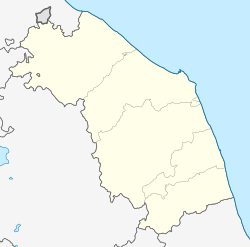Loreto, Marche
Loreto | |
|---|---|
| Comune di Loreto | |
 Piazza della Madonna with façade of the Basilica della Santa Casa | |
| Coordinates: 43°26′20″N 13°36′31″E / 43.43889°N 13.60861°E | |
| Country | Italy |
| Region | Marche |
| Province | Ancona (AN) |
| Frazioni | Costabianca, Grotte, Stazione, Villa Berghigna, Villa Costantina, Villa Musone, Villa Papa |
| Government | |
| • Mayor | Paolo Niccoletti |
| Area | |
• Total | 17.69 km2 (6.83 sq mi) |
| Elevation | 127 m (417 ft) |
| Population (28 February 2009)[2] | |
• Total | 12,278 |
| • Density | 690/km2 (1,800/sq mi) |
| Demonym | Loretani or Lauretani |
| Time zone | UTC+1 (CET) |
| • Summer (DST) | UTC+2 (CEST) |
| Postal code | 60025 |
| Dialing code | 071 |
| Patron saint | Birth of the Blessed Virgin Mary |
| Saint day | 10 December |
| Website | Official website |
Loreto (/ləˈrɛtoʊ/ lə-RET-oh,[3] US also /ləˈreɪtoʊ/ lə-RAY-toh,[4] Italian: [loˈreːto]) is a hill town and comune of the Italian province of Ancona, in the Marche. It is most commonly known as the seat of the Basilica della Santa Casa, a popular Catholic pilgrimage site.
Location
[edit]Loreto is located 127 meters (417 feet) above sea level on the right bank of the Musone river and 22 kilometers (14 miles) by rail south-southeast of Ancona; like many places in the Marche, it provides good views from the Apennines to the Adriatic.
Main sights
[edit]The city's main monuments occupy the four sides of the piazza: the college of the Jesuits; the Palazzo Comunale (formerly the Palazzo Apostolico), designed by Bramante, that houses an art gallery with works of Lorenzo Lotto, Vouet and Annibale Carracci as well as a collection of maiolica, and the Shrine of the Holy House (Santuario della Santa Casa). It also boasts a massive line of walls, designed by the architect (and military engineer) Antonio da Sangallo the Younger, which were erected from 1518 and reinforced in the 17th century.
Gallery
[edit]-
The Basilica della Santa Casa from behind
Twin towns and sister cities
[edit] Mariazell, Austria
Mariazell, Austria Fátima, Portugal[5]
Fátima, Portugal[5] Altötting, Germany[5]
Altötting, Germany[5] Częstochowa, Poland[5]
Częstochowa, Poland[5] Lourdes, France[5]
Lourdes, France[5] Nazareth, Israel[6][7]
Nazareth, Israel[6][7] Harissa, Lebanon[8]
Harissa, Lebanon[8] Għajnsielem, Malta[9]
Għajnsielem, Malta[9]
See also
[edit]- Shrine of the Holy House
- Shrines to the Virgin Mary
- Territorial prelature of Loreto
- Sisters of Loreto
References
[edit]- This article incorporates text from a publication now in the public domain: Chisholm, Hugh, ed. (1911). "Loreto (Italy)". Encyclopædia Britannica. Vol. 17 (11th ed.). Cambridge University Press. p. 7.
- Notes
- ^ "Superficie di Comuni Province e Regioni italiane al 9 ottobre 2011". Italian National Institute of Statistics. Retrieved 16 March 2019.
- ^ "Popolazione Residente al 1° Gennaio 2018". Italian National Institute of Statistics. Retrieved 16 March 2019.
- ^ "Loreto". Lexico UK English Dictionary. Oxford University Press. Archived from the original on 2020-03-02.
- ^ "Loreto". Merriam-Webster.com Dictionary. Merriam-Webster. Retrieved 11 October 2019.
- ^ a b c d e "Association of Towns awarded The Europe Prize". www.czestochowa.um.gov.pl. Retrieved 2009-10-10.
- ^ "Fraternitas 33 – eng". www.ofm.org. Archived from the original on 2016-03-03. Retrieved 2009-10-10.
- ^ "Nazareth and Loreto – Twin Shrines". www.loretonh.nsw.edu.au. Archived from the original on 2009-09-30. Retrieved 2009-10-10.
- ^ "Comune di Loreto – Loreto – Daroun Harissa – Accordo di gemellaggio". Comune.loreto.an.it. Retrieved 2013-03-26.
- ^ "Għajnsielem twins with Loreto, Italy". www.timesofmalta.com. 24 August 2022. Retrieved 2022-08-28.
External links
[edit]






